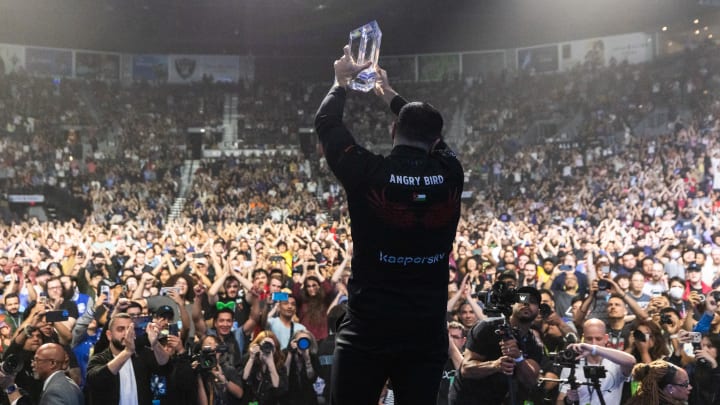What Does The Future of Esports Betting Look Like?

Esports betting is predicted to reach a market of over $3 Billion by 2028, but there is still a long road ahead. From widespread adoption to overcoming regulatory challenges, the betting space is full of as much challenge as promise.
Ultimately, esports betting will continue to grow alongside the industry as a whole, but what does the future look like? Is there a clear roadmap? Can it see a boom like Fantasy Football did, and what work is being done to push the growth of the esports betting market?
Daily Fantasy Sports
Daily Fantasy Sports, better known as DFS, has taken over the sports betting market in recent years. This style of betting is offered in esports by several operators including PrizePicks.
Related Article: The Evolution of Esports Betting
Cody Luongo, Head of Communications at Rivalry spoke more on this: “If you look at traditional sports and how the onset of legalized betting has impacted that, it has been higher viewership, higher sponsorship value. There's data that shows that when people place a bet on a football game, for example, they watch for longer. So for example, if it's a blowout, but they want to bet on one play at the very end, they will watch the entirety of the game.
So if you're a football fan, you don't just have the opportunity to watch the match, but you can also talk about your bet and wagers and other parlays that people might've hit on social media. So I think there's a big untapped opportunity there for many of the stakeholders involved, including game publishers as I think the data is pretty clear that when people are betting on games, there is higher viewership and engagement around it.”
Some of the other big players in esports DFS are Draftkings and Fanduel. Fanduel were one of the first traditional bookmakers to allow esports betting back in 2019, while Draftkings were ahead of the curve by adding League of Legends in 2015, but further expanded their esports offering with Call of Duty, CS:GO and more in late 2020.
Introduction to Traditional Markets
Esports is slowly making its way into mainstream markets, and this can be seen in the betting industry too. While esports betting was largely taking place on esports-only sites just five or six years ago, it’s now available on traditional sportsbooks such as Draftkings, Bet365, and many more.
This move into traditional sportsbooks allows esports to become more widely known, further increasing betting activity and general esports viewership. Luongo revealed to us that in 2022, esports betting accounted for “around 80/90% of the betting handle” at Rivalry, however it also only represented about 2% of all betting globally.
“2% can still be a meaningful number in the broader scale of things, but it ultimately means that there's only going to be a small handful of operators that are going to be able to really be able to capture a piece of that market share, right?”
Increase Viewership and Understanding
Esports has a unique challenge when attracting new bettors as each esports title is extremely different and has its own set of complex rules. For example, the Premier League Soccer, MLS, and the UEFA Euros tournament all have the same rules, and it’s easy for bettors to convert. However, Call of Duty and Valorant are extremely different and need much more knowledge to be truly engaged in the action.
“I think that all goes back to viewership and interest," Darius Gambino, Partner at Philadelphia-based law firm Saul Ewing said. "People are only going to bet on things that they're interested in, maybe not even watching a whole game of, but at least, you know, checking the outcome, checking the stats, things like that, I think esports requires a little bit more of an investment of time to understand the game.
Ewing added that the industry "took a big hit because we couldn't have in-person tournaments for the last three years. But it's just a matter of getting people to engage in that way again because I think when you do go to an in-person tournament, there's a different level of excitement. I think we will see an increase in the next 10 years because it's clear that video games and esports are a huge industry.”
The Global Market
The esports betting market differs greatly across the world. Countries such as Japan, South Korea, Germany and the United Kingdom all have sizable esports betting communities, and it is common for viewers to engage. However, while the United States still leads the industry in earnings, set to account for a projected market volume of $721 million in 2024 according to Statista’s Esports Betting forecast, the engagement just isn’t on the same level.
Related Article: The Biggest Challenges Facing Esports Betting
For example, it’s extremely common for European Counter-Strike teams to have betting sponsors. G2, Heroic, and many others are sponsored by betting sites such as CSGO Roll and Thunderpick. This means that esports betting is firmly ingrained into the esports community in europe, and everyone knows where they can go to bet.
The relationship between esports betting and the general esports community is not as strong in the US as it is in Europe. Yes, high revenues are coming into the bookmakers, but the esports organizations aren't receiving any of this. Compared to the international stage which sees teams and leagues don betting sponsors loud and proud, the United States has a long way to go before we see a mutually beneficial relationship between the two, which will hopefully result in a bigger and better esports industry.
The Future
As esports betting continues to evolve, there are several challenges the industry will face. Specifically in the US, different jurisdictions are at different stages of integrating esports betting into their laws. Issues around integrity, fairness and responsible gambling are all concerns, and this is a conversation that will continue to take place over the coming years.
However, esports betting clearly has the opportunity to grow, either through accessibility or through sponsorship.
“In 2022, esports was the third most popular betting segment in Brazil. Which is crazy to think about. And that's just because there's the accessibility and the option to bet on esports.
One of the things I say is that most esports fans don't know you can bet on esports, and if they do, they don't know where, right? So when I look at some of that statistics and data, I think that, yes, if you make this available to consumers, the segment will grow.” - Cody Luongo, Head of Marketing at Rivalry.
Bill Pascrell said, “esports is not a profit driver for developers, and we're seeing a lot of challenges with organizations closing and money drying up. So I know that there's some conversations looking at the rise of betting and daily fantasy and these sorts of things as a potential vehicle for that missing revenue in esports that we're not seeing.”
However, esports has a unique opportunity to be at the forefront of innovation in the betting industry as a whole, taking advantage of new technology to engage consumers. For example, new user experiences that appeal to esports fans will not only help esports fans engage in betting but also bring traditional bettors over to the esports industry.
Additionally, incorporating new data analytics and personalization into betting platforms is something that esports can help with. Creating tailored promotions, odds adjustments and more, could all increase engagement in the industry. Also, influencer marketing in the esports space can be used effectively and responsibly to further gain interest from consumers.
Hope for the Ecosystem
While there are plenty of challenges and roadblocks ahead for esports betting, there is also opportunity to be excited about. Beyond just the financial gains for operators and a new way to engage for fans, betting is a largely untapped reservoir of revenue for teams and leagues. Between outsized player salaries, the shuttering of multiple pro leagues, and layoffs affecting every aspect of the industry, it’s clear the the VC-fueled version of esports is not sustainable.
As Bill Pascrell alluded to, many esports organizations are losing money, and eventually having to drop out of the industry completely. Esports betting would bring in more revenue, and allow the industry to thrive.
Related Article: What is RMVG? Regulated Money Video Games Explained
In the U.S. especially, betting has been all but ignored by teams, leagues and developers. Perhaps as we continue to learn more about how to improve access and acceptance, how to work with regulators, a new revenue stream could revitalize the ecosystem.
